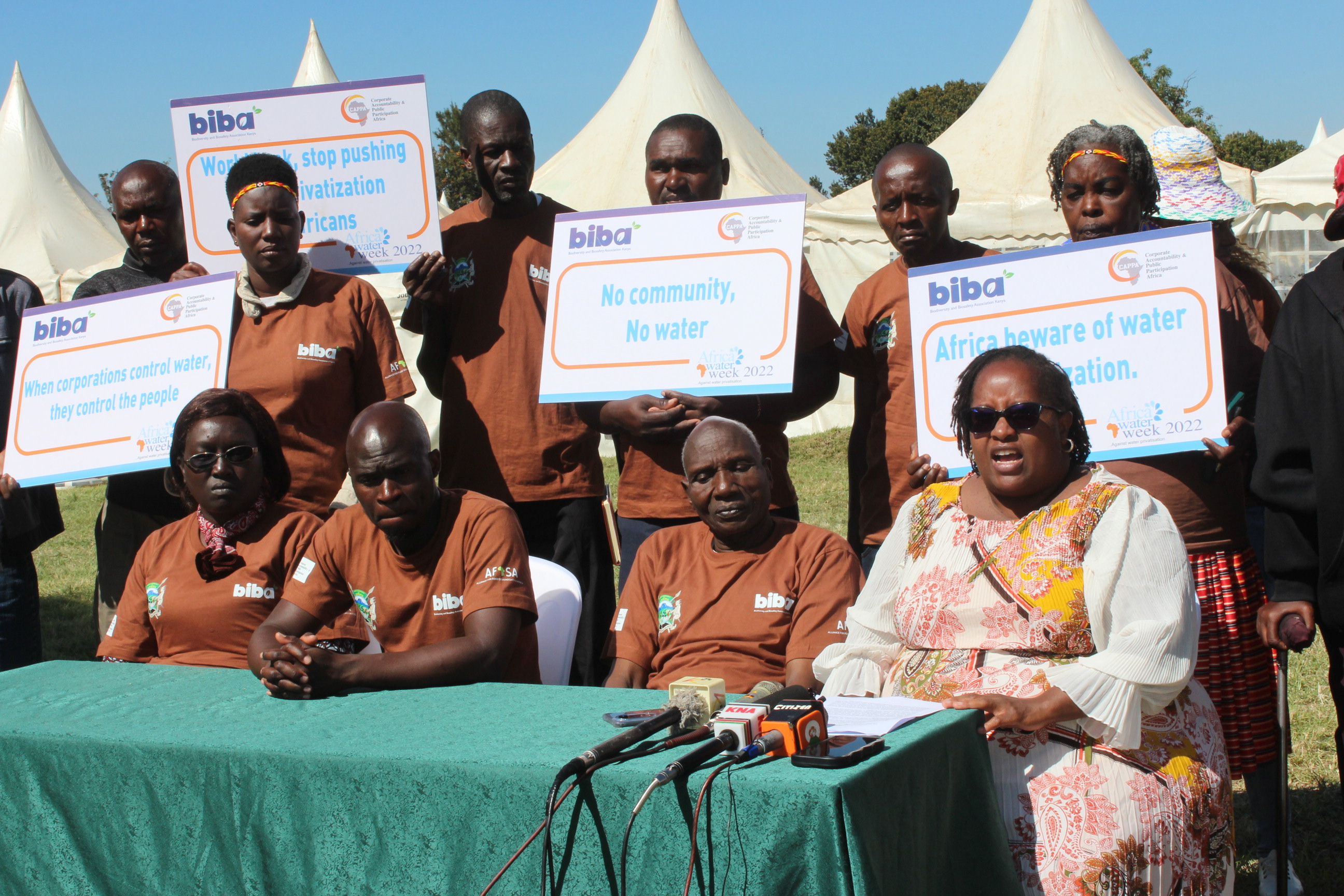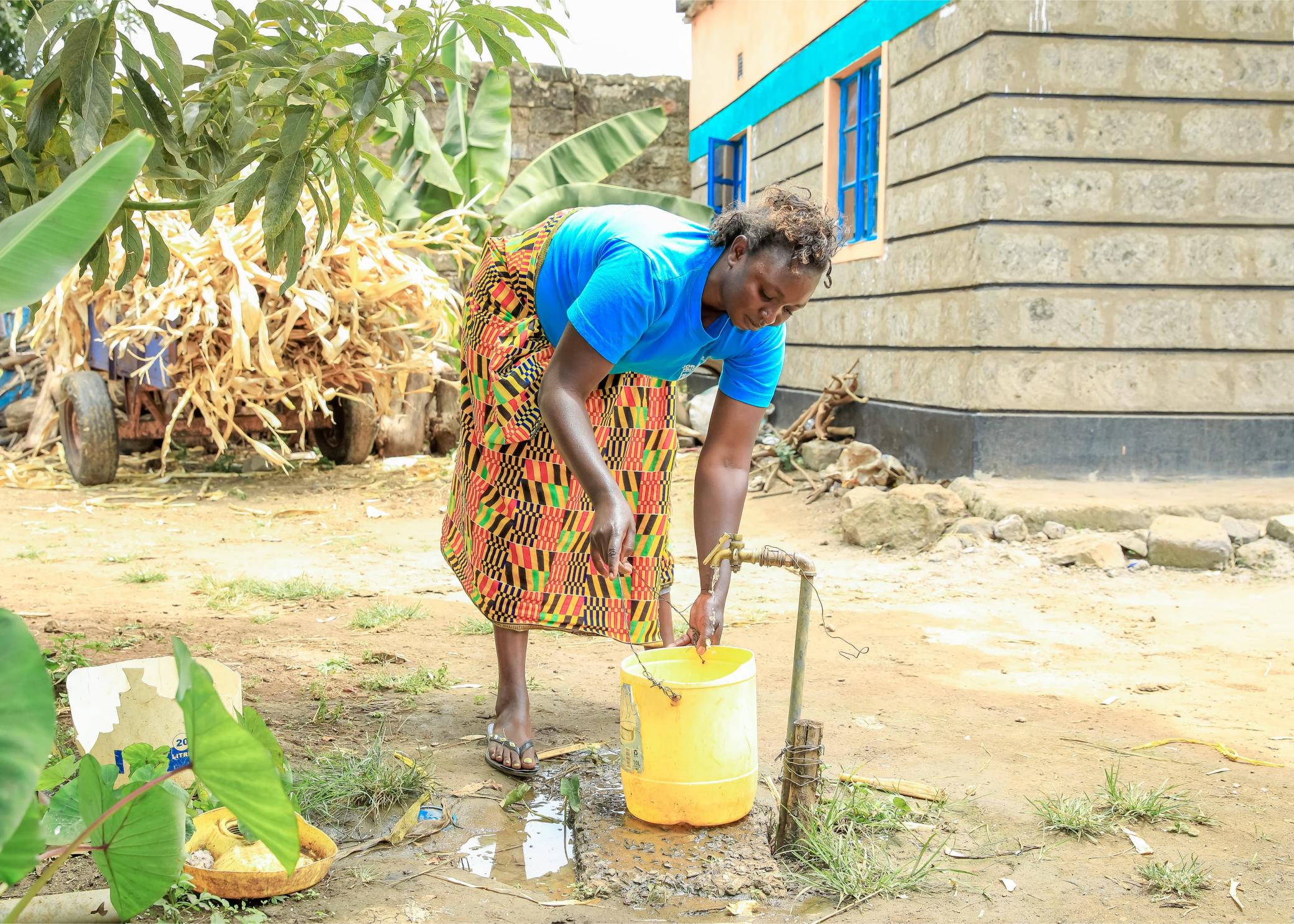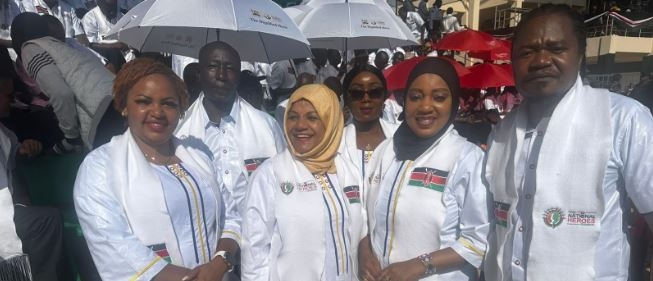 Members of Bio-diversity and Bio-safety Association of Kenya led by national co-ordinator Anne Maina (right) during a press briefing in Nanyuki, Laikipia county, on October 15, 2025
Members of Bio-diversity and Bio-safety Association of Kenya led by national co-ordinator Anne Maina (right) during a press briefing in Nanyuki, Laikipia county, on October 15, 2025Civil society organisations have blamed privatisation of water service companies for the commodity's high prices and inaccessibility.
They said privatisation prioritises short term
profits at the expense of communities’ resilience against rising climate
change.
The CSOs, which include community networks, youth groups, trade unions and grassroots movements have launched a continental campaign against water privatisation – Our Water Our Right Africa Coalition (OWORAC) – a pan-African movement that defends the right to water.
The lobby groups include Senegalese Water Justice Network (Senegal), Corporate Accountability and Public Participation Africa (CAPPA) from Nigeria, Revenue Mobilisation Africa (Ghana), African Centre for Policy and Advocacy (Cameroon) , Biodiversity and Biosafety Association of Kenya.
Others are Institute of Black World (US), Matabeleland Institute for Human Rights (Zimbabwe), Youth Go Green Network (Liberia), Center for Environmental Justice CJE (Togo), Gender CC Southern Africa, Health of Mother Earth Foundation (Nigeria) and Liberty Pro bono Initiative for Environmental Justice (Uganda).
In a statement signed by 20 organisations, the lobby groups said water is a human right that must never be compromised for profits.
“Africa faces multiple and overlapping environmental challenges and climate change, often reveals itself most forcefully through water,” Anne Maina, national coordinator of Biba Kenya, said.
Maina said privatising water provision neglects low income and rural communities that are considered unprofitable.
It also raises tariffs that lock the poor out of access and exposes them to disaster as climate change continues to ravage many vulnerable households.
Maina said prolonged droughts, devastating floods, coastal
erosion and increasing unpredictability in rainfall are disrupting lives and
livelihoods.
The 2022 Kenya Demographic and Health Survey revealed that 94 per cent of the urban population in Kenya have access to drinking water against 71 per cent in rural areas, with only 53 per cent of all households having water in their premises.
Maina said in the country, water firms formerly managed by the government are being privatised and later sold to Kenyans at very high prices.
Worst affected are urban settlements with no access to piped water and depend on private vendors who take advantage of the monopoly to make profits.
“In many urban settlements,
a jerican of water goes for between Sh30 and Sh50, which is unaffordable to many
who are already struggling to feed their families,” she said.
 Florence Muthoni, a resident of Kamuchege village in Kirinyaga county fetching water from a tap in her homestead.
Florence Muthoni, a resident of Kamuchege village in Kirinyaga county fetching water from a tap in her homestead.Maina said proposals to have pre-paid water meters will only serve to aggravate the situation as the poor will struggle even more to access clean water.
The lobby groups want water made accessible to all, saying its privatisation has allowed those with access lock them for sale.
Maina said in the Horn of Africa, seasons of drought have dried rivers and wells, leaving millions dependent on humanitarian aid.
On the other hand, countries such as Mozambique and Nigeria have grappled with catastrophic cyclones and floods that submerge boreholes and wells, leaving thousands without safe water and heightening water-borne diseases.
In North Africa, rising seas push saltwater into fragile coastal aquifers, while intensifying heat drains rivers and reservoirs through rapid evaporation.
Local communities in the region are caught between contaminated groundwater and vanishing surface supplies.
In the semi-arid region of Western and North Central Africa, irregular rainfall has been unsettling agriculture and fueling conflict over shrinking water sources.
“All of these shocks collide with decades of under-investment in public water systems that leave societies doubly exposed to climate extremes and deprived of the infrastructure that might have cushioned their impact”.
But instead of African countries taking the challenges as a wake-up call to invest in stronger publicly managed water systems capable of protecting life under climate stress, the lobby groups said most have colluded with private actors to justify the transfer of water provision from the public sector.
The surge in desalination projects promoted as a climate-proof solution, Maina said is a pointer to the collusion between governments and private actors, despite being extremely energy-intensive and largely dependent on fossil fuels while producing brine that disrupts marine ecosystems.
“Desalinated water is more expensive than conventional sources. The cost of desalinated water is 73 per cent higher than the existing supply according to Food & Water Watch, even as it has been flagged multiple times for environmental violations,” she said.
Last year, the Kingdom of Morocco entered into a 35-year concession with Veolia, a firm that specialises in desalination, to develop and manage a massive seawater desalination project, planned to be the largest in Africa and the second largest in the world.
But Maina said the company’s track record is far from reassuring and marred by controversy, saying in Bucharest, Romania, its 25-year water concession saw tariffs rise almost six-fold, forcing households to bear the heavy costs of privatisation.
“Africa’s water cannot be auctioned off to the
highest bidder without imperiling the very basis of life. Sustained public
financing must be channeled into water and sanitation infrastructure, ensuring
that utilities are not only functional but robust enough to withstand future
shocks,” Maina said.
They called for investments in renewable energy, protection and restoration of watersheds, wetlands and aquifers and participatory governance that guarantees that communities themselves shape decisions about their water.
Instant Analysis
In a statement signed by 20 organisations, the lobbies insisted that the commodity is a human right that must never be surrendered to the logic of profit. The 2022 Kenya Demographic and Health Survey revealed that 94 per cent of the urban population in Kenya have access to drinking water against 71 per cent in rural areas, with only 53 per cent of all households having water in their premises. The lobby groups said instead of African countries taking the challenges as a wake up call to invest in stronger publicly managed water systems capable of protecting life under climate stress, most have colluded with private actors to justify the transfer of water provision to the private sector.












